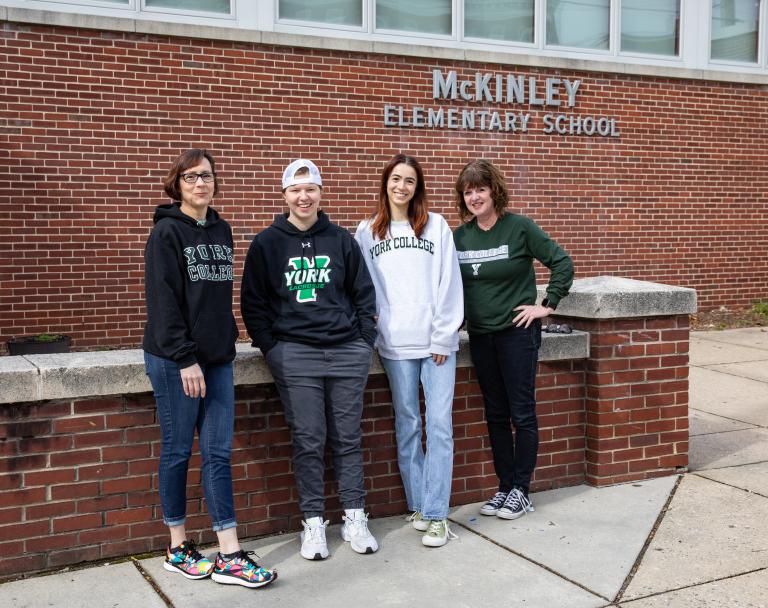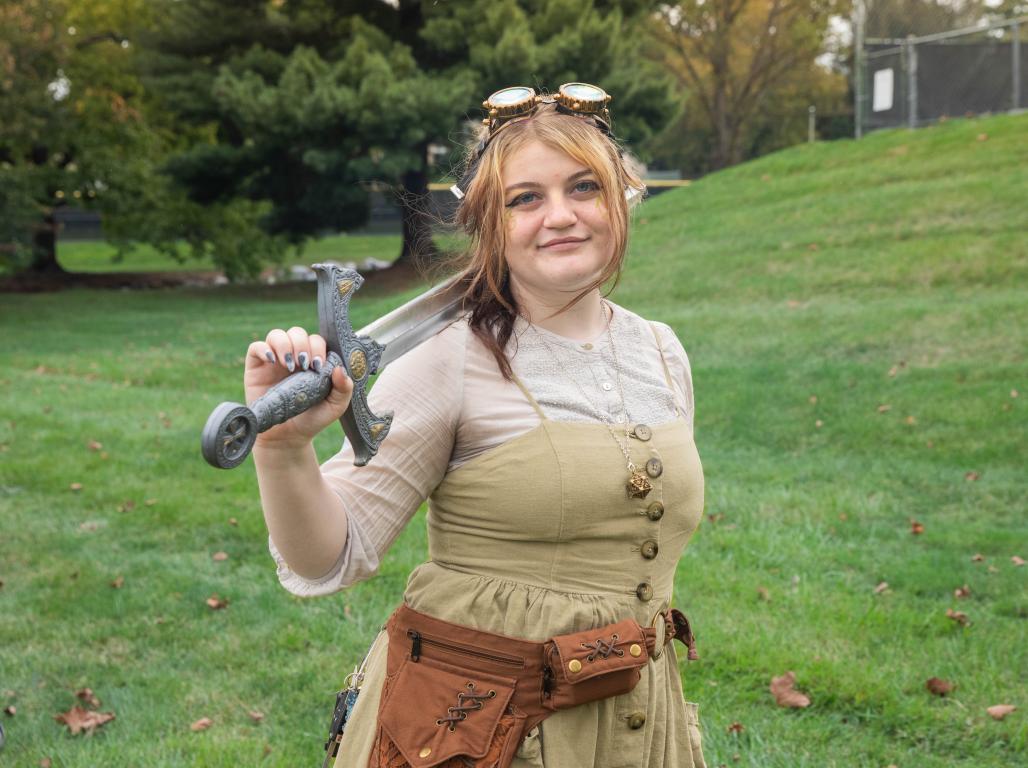YCP Students Connect with York City Youth to Build Leadership Experience

Students in Human Services and Recreation Leadership courses learn leadership skills and offer mentoring to local youth they welcome onto campus.
Hands-on, experiential learning helps students become career-ready. And that’s exactly what Isabella Garabo ’23 (Hillsdale, NJ) and Grace De Araujo ’24 (Edison, NJ) have learned. The Sport Management major and Recreation Leadership major recently took part in courses taught by Dr. Julie Saville, Assistant Professor of Recreation Leadership, and Dr. Robyn Maitoza, Associate Professor of Human Services. The courses pair York College students with youth from York City schools.
“The (York College) students really benefit in multiple ways,” Dr. Maitoza says. “They get to apply what we’re talking about in the classroom to working with youth. They also benefit from working with students who perhaps come from backgrounds that our students don’t have exposure to.”
An Eye-Opening Experience
Isabella, a Sport Management major, was paired with two McKinley School buddies throughout the course she took, Applied Youth Development, with Dr. Maitoza. While she had experience coaching students at sports camps, this was a new endeavor for her. Before taking the course, Isabella had debated whether to pursue a career in coaching or a future focused on business and social media marketing.
“This reassured me that I love working with youth,” she says. “It pointed me in the direction of coaching. I know that whatever I do, I will be coaching.”
The experience also opened her eyes to the different lives of youth just a short distance from the College. Her buddies had never stepped foot on the campus despite living within walking distance. When the buddies opened up about their struggles at home and in school, she wasn’t always sure how to respond.
“I didn’t expect to hear a lot of what I did hear. It was heartbreaking,” she says. “You truly never know what someone is going through. These types of experiences make you see more that you might be closed off to. It makes you thankful for what you have.”
Through the class instruction and her mentoring, Isabella learned about youth developmental stages and the importance of encouraging exploration and making mistakes.
The hands-on approach to learning is a concept that Dr. Maitoza is working to incorporate into all her courses.
Dr. Maitoza has been teaching the youth development course since 2015. It provides strategies and techniques for working with youth ages 10 to 19. The course has evolved to include a mentoring program in which seventh- and eighth-grade students from McKinley Elementary School and Alexander D. Goode Elementary School in York City visit the campus each week to be mentored by York College students.
Two younger buddies are paired with two York College students, who come up with activities for the youths, perhaps showing them some aspect of the campus or engaging in artwork. They also take part in activities as a group, painting, carving pumpkins, or playing get-to-know-you games.
“It reinforces how important it is to connect our students to our community and do more applied learning experiences like this,” she says.
Leadership in Action
Dr. Saville also creates experiential learning opportunities for her students, who interact with local youth through her Leadership and Group Dynamics course.
The course teaches leadership skills and team-building through fun activities. Each semester, students spend work with fourth- and seventh-grade students from McKinley and Goode schools for two hours each. In the weeks before the city students arrive, teams of York College students study and plan leadership initiatives aimed at helping the younger students learn about truth, accountability, support, trust, and energy, also known as the TASTE model.
“It’s a wonderful synergistic partnership,” says Dr. Saville. “The York City kids get to come and practice these skills; our students get to work on these skills.”
When the youths arrive on campus, the college students toss them a big beach ball covered in written questions. A youth who catches the ball answers whatever question is under his or her thumb. The ice-breaker game helps participants connect quickly. The students meet for only an hour each week for two weeks, so creating a bond quickly helps the college students have a greater impact.
Smaller groups then take part in activities based on one of the TASTE concepts. In an activity called Minefield or Gophers in the Yard, obstacles are placed all over the floor inside a rectangle. Students pair off, one closes his or her eyes, and the other tries to verbally guide the sightless partner through the minefield without stepping on anything.
The activity teaches youths the importance of specific communication and clear instructions. The day ends with a debriefing in which the students discuss what they’ve learned and how the activities impacted them.
The partnership with the city schools had existed since before Dr. Saville came to York College 20 years ago. The Leadership and Group Dynamics course was founded by Dr. Jeff Witman, who taught the course for many years until Dr. Saville took it over five years ago. It has proved a positive learning experience for the college students and the city youths.
“I can tell a kid they need to collaborate, but telling them that is easy,” says Dr. Saville. “Having them figure it out themselves through the activities we choose is a lot harder.”
Grace took part in Dr. Saville’s course. While her goal is to work with older adults, Grace finds great joy in helping those of any age achieve wellness and find purpose in life.
Through the Leadership and Group Dynamics course, Grace discovered ways to reach that goal. Before the city youth came to campus, she and her classmates researched and came up with activities based on the TASTE model, then modified them to fit various age groups.
“When the kids came, it was nerve-racking, but we were prepared,” she says.
The two courses helped prepare Grace, Isabella, and their classmates to present activities that are safe, thoughtful, and age-appropriate. No matter what careers they choose, they’ll be prepared to lead activities for all ages.
“It’s a great opportunity not only to connect with youth,” says Isabella, “but also you learn a lot.”




